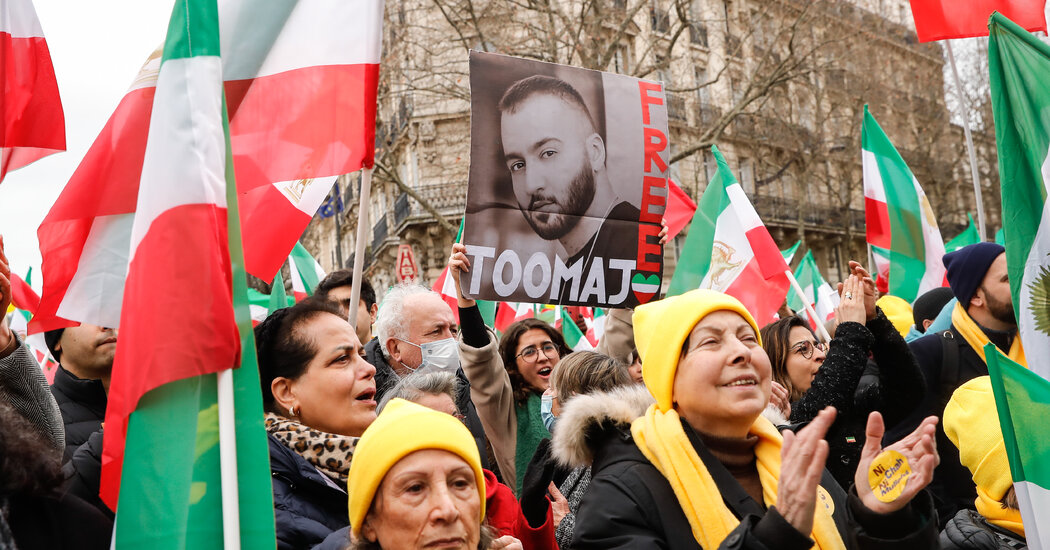
A dissident rapper has been sentenced to death in Iran for releasing music in support of anti-government demonstrations that have rocked the country in 2022, his lawyer said, in a case that drew global condemnation.
Rapper, Toomaj Salehi, 33, has been one of the most prominent voices among those arrested in nationwide protests against Iran's religious rulers following the death of Mahsa Amini, 22, while in police custody. Human rights organizations have called for Mr Salehi's release, saying he has been tortured in prison and warning that he could be executed.
Amir Raesian, Mr. Salehi's lawyer, told the reformist Iranian newspaper Shargh in an article published on Wednesday that a court in the central city of Isfahan sentenced Mr. Salehi to death and that his client plans to appeal.
The office of the US Special Envoy for Iran condemned the ruling, calling it another example of the regime's “brutal abuse of its citizens, disregard for human rights, and fear of the democratic change the people seek.” Iranian”.
Mr Salehi was initially arrested in October 2022 for releasing music criticizing the government and supporting demonstrations triggered by Ms Amini's death while in the custody of Iran's morality police. He also posted videos on his Instagram account encouraging his followers to protest.
Last November, Iranian authorities accused him of “spreading corruption on earth”, a crime that can carry the death penalty. The United Nations experts said the court proceedings took place behind closed doors without the presence of Mr Salehi's lawyer and expressed concern over reports that the artist had been tortured, citing reports of a broken nose and several fingers broken.
In April 2023, human rights groups again alleged that Mr Salehi – who has been consistently denied access to legal representation – had been tortured in prison and required urgent medical attention.
Mr Salehi was sentenced three months later to more than six years in prison by an Isfahan court after a closed-door trial. He was also banned from producing music or singing for two years, according to a State Department document. Iran's Supreme Court found problems with that ruling, and Salehi was released from prison in November 2023, only to be rearrested less than two weeks later and ultimately charged with “propaganda against the state,” according to UN experts.
The Isfahan court's move to effectively ignore the Supreme Court and hand down a death sentence was “unprecedented”, Mr Salehi's lawyer told Shargh.
The Center for Human Rights in Iran, an independent advocacy group based in New York, said the death sentence represents “a new low in Iran's crackdown on dissent.”
“Toomaj’s incarceration stems from his outspoken advocacy against state oppression,” it said in a statement. “It is imperative that advocates for free speech and dissent unite to call for his immediate release.”
The State Department, which described Salehi as a “political prisoner,” called reports that a death sentence had been handed down “disturbing.”
“We're talking about someone who has already suffered torture and other harsh treatment in detention,” Vedant Patel, a State Department spokesman, said at a news conference Wednesday.
Mr. Salehi was well known in Iran long before his imprisonment, for speaking in Persian about injustice and inequality. In lyrics that resonated deeply with young Iranians, he wrote about poverty, child labor and executions, while denouncing the country's clergy for corruption, state mismanagement and repression.
“The upper classes have enough of a voice,” he once said in an Instagram video. “I believe rap is the voice of choked throats.”
He had his first big hit with “Rathole” in 2021, rapping about regime apologists in Iran and abroad. The text shocked Iranian leaders: Mr. Salehi was arrested in September 2021. He was released on bail after fans and human rights organizations campaigned for his freedom.
The episode did not dissuade Salehi from pursuing his art: “The pen that does not write will break. This is what these people suffered,” he said he wrote on social media that month.
When anti-government protests erupted in Iran in September 2022, Salehi filmed himself with protesters and again used his lyrics to target the country's religious leaders.
“We are the voice of the anger of people whose voices have been silenced,” he rapped in “Battlefield,” released during the height of the demonstrations.
“We come to the streets like ghosts and become a nightmare for the government,” the lyrics continue, in a music video interspersed with protest footage. “Let's see the light after this hell. Neither repression, nor law, nor execution can stop us.”
Iranian security forces ultimately killed hundreds of protesters and arrested tens of thousands in a widespread crackdown. Since then, Iranian authorities have carried out a series of executions after summary trials on protest-related charges.
In a video caption posted to Instagram on October 28 – two days before his initial arrest in 2022 – Mr Salehi said: “This is a revolution.”
“Every step we take is necessary to achieve our goal,” he wrote. “Join us!”
